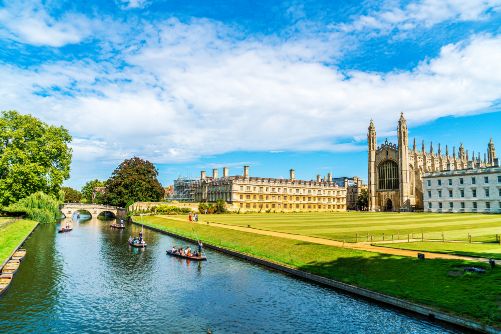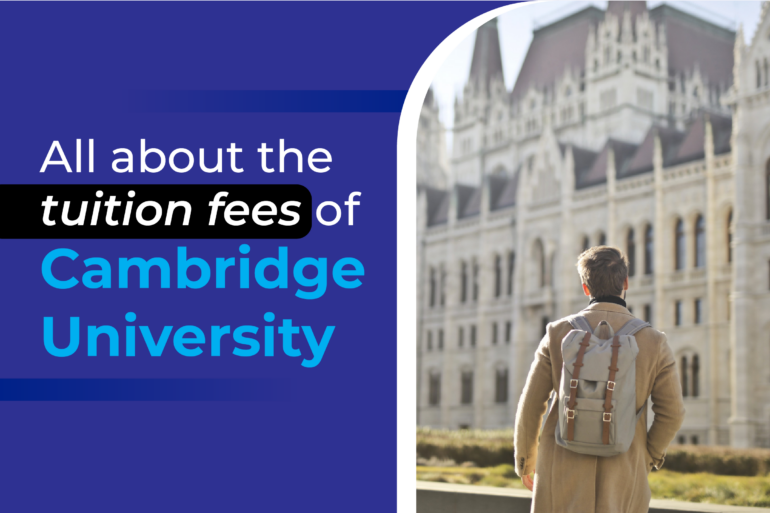Table of Contents
Cambridge University| Upholding Global Educational Standards, Including Tuition Fees
With over 20,000 students from all walks of life and all corners of the globe, over 12,000 staff, 31 Colleges, and 150 departments, faculties, Schools, and other institutions, no two days at the University of Cambridge are the same. There are various schools, faculties, departments, and colleges at the University. Governed by their own statutes and regulations, the 31 Colleges are an essential part of the university’s structure.
In addition to being a member of the university and an academic faculty/department, our students are also members of a college community, which provides pastoral and academic support to each individual. Let’s dive deeper to learn about the Cambridge University fees.
Cambridge University | A brief overview
Located approximately 60 miles north of London, the University of Cambridge dates back to 1209. Around 19,000 students attend the university, with more than 35% pursuing graduate studies.
Arts and humanities, biological sciences, clinical medicine, humanities, social sciences, physical sciences, and technology are the seven schools. Cambridge’s academic year has three terms- Michaelmas (fall), Lent (winter), and Easter (spring). The language of instruction at the university is English.
Cambridge has 31 residential colleges that are in charge of admitting undergraduate and graduate students, and three colleges at Cambridge are for women only- they are Lucy Cavendish College, Murray Edwards College, and Newnham College. The colleges also provide small-group instruction sessions for undergraduates.
These schools are made up of dozens of academic departments and other divisions. At the University of Cambridge, most undergraduate students might get guaranteed college housing for at least three years. Many new graduate students can also take advantage of college housing. Around 20% of the student body is from outside the European Union. Tuition costs for non-EU students are higher and vary depending on the field of study. There are over 100 libraries in Cambridge, including college and department libraries. The university is home to over 140 research centers and institutes, including the Centre of African Studies, the Cambridge Centre for Economic and Public Policy, and the Institute of Theoretical Geophysics. In the most recent fiscal year, the university received approximately $415 million in research grants and contracts.
Cambridge University | Fees

You must consider a variety of costs, including tuition fees, regardless of which university you apply to. Whether you are a domestic or international student will impact the tuition rates you pay for your study.
Tuition fees for home students
The annual tuition fee for home students beginning their first undergraduate degree in 2023 will be £9,250. The government-mandated tuition fee for 2024-25 has yet to be decided. Before applying or accepting an offer from the institution, you should check the university website for the most up-to-date tuition fee information.
The university dedicates itself to providing a world-class education as well as access to the best teachers, resources, and support available. As a result, it spends far more than the government-mandated tuition fee on each student each year to ensure they get the most out of their Cambridge education.
Tuition for students residing in Crown Dependencies (Islands)
For new and continuing students from the Islands (Channel Islands and Isle of Man) who come to England solely for higher education study and qualify for Home fee status based on three years of residency in the UK or Islands, the annual tuition fee at Cambridge University is £9,250 in 2023.
Fees for affiliated students’ tuition
Tuition fees for Home fee status students pursuing a second undergraduate degree (whether affiliated or full course) may differ from the standard Home fee.
Tuition fee for a study abroad year
If your program includes a year abroad, the tuition fee is different. The current fee for a Home student studying abroad for a full year is 15% of the tuition charge in Cambridge for that year. Year-abroad tuition fees for the following years have not yet been decided, but they are expected to climb annually.
Tuition fees for international students
International students’ tuition fees vary depending on the course they enroll in. In addition to tuition, most international students must pay college fees.
Fee status for EU, EEA, and Swiss students
Most EU, EEA, and Swiss students starting their studies in October 2021 will now be classified as international/overseas students and should refer to the university’s website for more information on the tuition and college fees they have to pay for their chosen course.
This follows the UK Government’s amendment of fee status regulations due to Brexit, as outlined in the Education (Student Fees, Awards, and Support (Amendment) Regulations 2021.
There are some exceptions, and as long as your application meets the legislative requirements (including residency requirements), the following students will usually qualify for Home fee status-
- Irish nationals staying in the UK or Ireland.
- Those EEA (or Swiss) nationals who have settled status or pre-settled status under the EU Settlement Scheme (EUSS).
- EEA and Swiss nationals (and family members) with a right to live in Gibraltar arising from Withdrawal Agreements
Key takeaways
- There are various schools, faculties, departments, and colleges at the University. The 31 Colleges are an essential part of the university’s structure that have their own statutes and regulations.
- While applying to a university, you must consider a variety of costs, including tuition fees. Whether you are a domestic or international student will impact the tuition rates you pay for your study. Tuition fees differ for students with different fee statuses. Tuition fee statuses at the University of Cambridge also depend on students’ nationality and study program structure. Students should check the university’s website before applying.
Did you find this blog informative? If so, please share your thoughts in the comments section below. Click here to contact us for more information on Cambridge University | Fees. We would be happy to assist you with your queries.
Liked this blog? Read next: How to get admission in Oxford | All you need to know
FAQs
Q1. What GPA is required to get admission to Cambridge?
Ans- Students must maintain a GPA of at least 3.7 in order to be considered for admission to Cambridge.
Q2. Is the application process the same for applicants from countries outside the UK at Cambridge?
Ans- International applicants must complete a UCAS application as well as an additional questionnaire. Every year, the University conducts interviews in various countries. You may have to apply earlier if you want to be considered for an interview in one of these countries.
Q3. Which are the best programs to study at Cambridge?
Ans- Artificial Intelligence, Arts and Humanities, Biology and Biochemistry, Biotechnology and Applied Microbiology, Cardiac and Cardiovascular Systems, Cell Biology, and Chemical Engineering are some of the best programs available at Cambridge.







